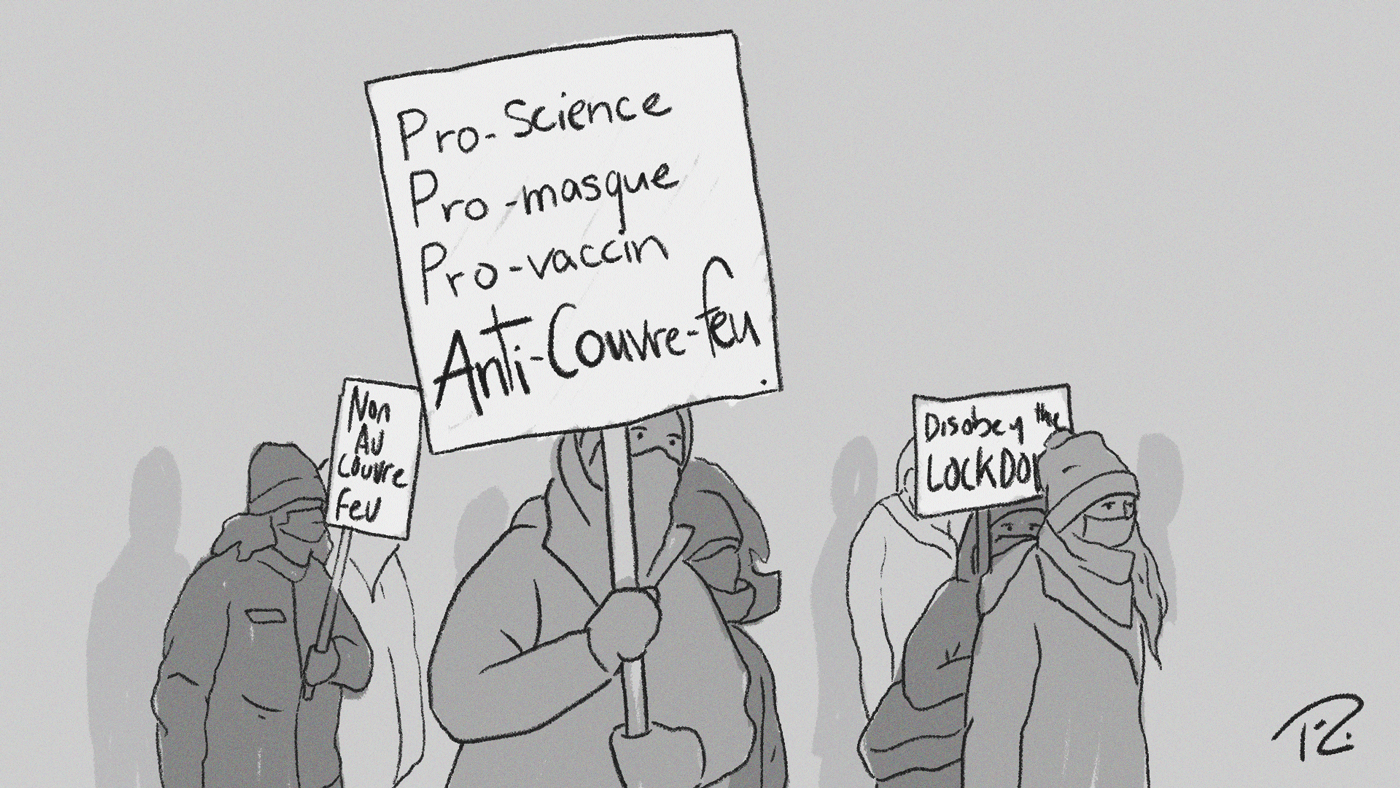Over 100 people gathered to protest against the curfew that is impacting the homeless and potentially giving more power to the police
In response to the rising cases of COVID-19 in Quebec, the provincial government has enacted a controversial curfew, which is seen to negatively impact the homeless and people in poverty. There has been public outcry and protests against the curfew.
The group responsible for the demonstration on Jan. 16, Pas de solution policière à la crise sanitaire, stated the protest was to push back on the increased power being given to the police.
In a press release, the organization stated they do not affiliate with right-wing groups, such as the anti-mask and anti-lockdown protests that have taken place in recent months.
“This demonstration aims to denounce the political choice of Legault’s government to impose a curfew throughout Quebec in response to the increase in cases, by hospitalizations, and deaths related to COVID-19,” read the statement. “After 10 months of a health crisis, the CAQ is again opting for the police solution.”
In a public statement, the group said that the goal of the protest was to denounce the use of police in a public health crisis, and encourage the government to relocate those funds in a more effective manner.
Let us stand in solidarity in the face of police repression, let us learn not to leave anyone behind,” said the statement.
“The police presence really affects the homeless people in a negative way, because they are trying to avoid the police,” said Jessica Quijano, a spokesperson for the Defund the Police Coalition and a member of the Iskweu Project, an initiative of the Native Women’s Shelter of Montreal.
Quijano spoke about the recent death of an Innu man that was living on the streets. According to a CTV article, the man froze to death near the Open Door homeless shelter, which due to the COVID-19 restrictions, was no longer allowed to have clients overnight.
Quijano explained that police presence doesn’t help in a pandemic; she used the criminalization of people during the AIDS crisis as an example.
We can’t trust the police to use their discretion, because we know that the SPVM has a history of racism,” she said.
“At least offer a house to the homeless, and not just shelters, places where people could isolate and be comfortable,” she said, explaining that the best solution to the issue is giving the homeless resources. “Not giving people tickets, not to people that are already in poverty.”
Quijano explained that before the curfew was implemented, there were outbreaks in shelters and homeless people who had tested positive were walking around in public. The curfew has just added to the shelters’ struggles to serve the homeless community in a safe way.
“It makes you really question the legitimacy of the public health [association] when they are making these decisions,” Quijano said.
On Tuesday, Montreal Mayor Valérie Plante called for homeless people to be exempt from the curfew, but later that day during a COVID-19 press brief, Premier François Legault rejected it, as he believes people would impersonate the homeless to get out of curfew.
The SPVM said in a statement that officers have to show tolerance and judgement in their interventions with the homeless.
“Before giving a ticket, each situation is analyzed in consideration of the specific context and particularities,” read the statement. “If it’s possible, officers can also accompany these persons to the appropriate resources.”
“These are necessary measures to counter the spread of the virus,” said Marie-Louise Harvey, media spokesperson for the Ministère de la Santé et des Services sociaux, who explained that the priority of the curfew and the restrictions was to lessen strain on hospitals.
She also stated that while the ministry has no official survey of the population’s view of the curfew, “It does know that a certain percentage of the population is unhappy with the situation.”
Graphic by Taylor Reddam




